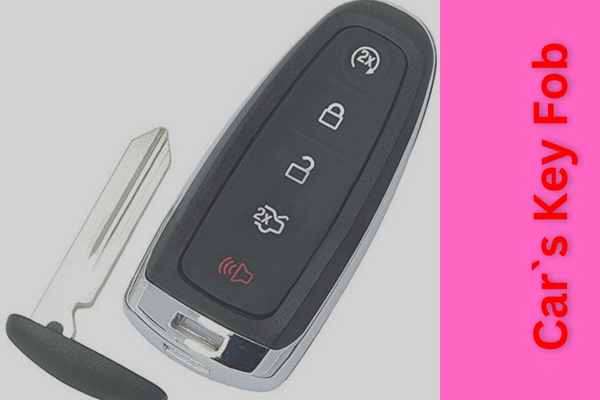Key fobs are an incredibly convenient way to access your vehicle, home, and other secure areas. However, they can also be incredibly sensitive and cause problems if not appropriately maintained. This blog post will explore why key fobs can be so sensitive, what you can do to prevent issues, and how to troubleshoot when they occur. Get ready to learn about key fobs and the best ways to keep them working correctly!
What Is a Key Fob?
A key fob is a device designed for convenience and security. It is a tiny, programmable keychain that can control access to various things like your car, home, or office. It is sometimes referred to as a key card, security token, or access card.
The key fob is usually a small, flat, plastic device with a display screen (or keypad) and two buttons that allow the user to unlock a door or start a vehicle. The key fob is connected to an electronic circuit board that is programmed to perform certain functions when the buttons are pressed.

The most common use of a key fob is as a car key. The key fob is programmed with a code that can be used to start the vehicle, and it also has a panic button that will sound the car’s alarm if pressed. This security feature makes it difficult for someone to steal your vehicle.
You might also read: Why Is The Fuel Filter Only Half Full?
Benefits of the Key Fob
Car key fobs are a convenient and hassle-free way to unlock and start your car. They provide added security, and they can also help make life a little easier. Here are some of the benefits of having a car key fob:
Convenience: You no longer need to dig your pockets or purse to find your car keys. All you need to do is press a button, and your car door unlocks. You can also lock your car by pushing a button – no more fumbling around with a key.
Added Security: A car key fob does more than unlock your car. It also makes it harder for someone to steal your vehicle, as they need to know the code to your fob to start the engine.
Remote Access: Some car key fobs allow you to start your car from a distance. This can be incredibly useful in situations where you might run late and don’t want to waste time walking to your vehicle.
Saves Time: Instead of having to fidget with a key, you can press a button, and your car unlocks. This can save you time when you’re in a rush.
Ease of Use: Car key fobs are easy to use and don’t require any mechanical knowledge. You can easily program them to work with your car, and they don’t take up much space.
Causes of Key Fob Sensitivity
Signal Interference
Signal interference is a common problem for many modern electronic devices, and key fobs are no exception. Signal interference can cause a crucial fob’s sensitivity to become unreliable, leading to erratic performance and potential problems with security. Understanding signal interference and how it affects your key fob can help you prevent these issues.
Signal interference is the disruption of a signal due to external sources. This can include electromagnetic radiation from other sources, like power lines, radio or television broadcasts, and cell phone towers. Physical objects, such as walls or large metal objects, can cause it. When these external sources interfere with a signal, it can impact how a device receives and processes that signal.
When signal interference affects your key fob, it can cause its sensitivity to become unreliable. This means that the key fob may not recognize a signal when it is present, or it may not respond to a signal when it is sent. As a result, the key fob may not unlock or start the car when the signal is sent. This can be very frustrating and even create a potential security risk if you rely on the key fob to access your vehicle.
Damaged Components
A key fob is a small, wireless device used to operate functions on a car remotely. It starts the car, unlocks the doors, and activates other features. The key fob typically has a range of up to 50 feet and uses a radio frequency signal to communicate with the car.
The key fob sensitivity is the ability of the key fob to respond to the signals it receives from the vehicle. When the key fob is damaged, it can cause the sensitivity to be diminished, which can result in the key fob being unable to send the signal to start the car, lock the doors, or activate other features.
Several reasons a key fob can become damaged and cause sensitivity issues. The most common cause is water damage. If the key fob has been exposed to moisture or liquid, it can corrode the internal circuitry and make it less sensitive.
Another common cause of key fob sensitivity issues is physical damage. If the key fob is dropped or otherwise damaged, it can cause the internal circuitry to become misaligned and cause sensitivity issues.
Finally, a key fob can become damaged through normal wear and tear. Over time, the internal circuitry can become worn and cause the key fob to be less sensitive.
Low Battery
When a key fob’s battery is low, it can cause it to become more sensitive. This is because the device is using more energy, which can cause it to become over-sensitive. As a result, getting the key fob to unlock your car may take a few tries. This can be a severe inconvenience and even dangerous if you try to unlock your vehicle in an emergency.
When a key fob operates, it sends a signal to the vehicle’s control module. This signal is used to open the doors or start the engine. If the battery is low, the signal strength may be weaker than usual, resulting in decreased sensitivity or range.
For example, if the key fob is used to start the vehicle, it may be unable to do so if the battery is too low. This can be highly inconvenient, especially if you’re in a hurry and don’t have time to replace the battery.
In addition, if the key fob is used to unlock the vehicle, it may take longer than usual for the doors to open, or it may not work. The same goes for features such as trunk releases, locks, and remote panic alerts.
Malfunctioning Parts
The sensitivity of a key fob can be affected by several factors, including the materials used to construct it, the age of the fob, and any malfunctions or damage that may have occurred over time. Here, we will look at how malfunctioning parts can cause a key fob to become overly sensitive, resulting in unexpected behavior.
The most common cause of key fob sensitivity is malfunctioning parts. In some cases, the sensitivity issue may be due to interference from other electronic devices, such as a cell phone located near the key fob. It’s also possible that the fob is picking up signals from additional key fobs in the area.
Another cause of key fob sensitivity is a malfunctioning circuit board. The circuit board is responsible for the fob’s internal operations, and if it is not functioning correctly, it can increase sensitivity. This could result in the fob responding to signals that it was not intended to respond to or in other unexpected behavior.
Lastly, a malfunctioning antenna can cause a key fob to become overly sensitive. The antenna is responsible for broadcasting radio signals from the fob, and if it is not functioning correctly, it can lead to a decrease in the fob’s sensitivity. This could make the fob unable to detect signals or respond to them when intended.
Solutions to Key Fob Sensitivity
Replacing the Button
If your key fob is not responding correctly, then one of the first solutions to consider is to replace the button. This relatively straightforward process can be done at home with just a few essential tools. First, locate the button that needs to be replaced. Once you have found it, unscrew the old switch and replace it with a new one. Now, test the key fob to see if the issue is resolved.
Fixing the Wiring
If replacing the button does not fix the problem, then it may be due to a faulty wiring connection. To fix this issue, ensure all the wiring is connected correctly. If there are any loose wires or breaks, then they need to be replaced. Once the wiring is connected correctly, test the key fob to see if the issue is resolved.
Repairing the Circuitry
If replacing the button and fixing the wiring does not solve the issue, it could be due to a problem with the circuitry of the key fob. If this is the case, it is best to take the key fob to a qualified technician who can repair the circuitry. This type of repair is likely to be more expensive than the other solutions, but it is a surefire way to get the key fob functioning again.
Reducing Signal Interference
Another potential solution to key fob sensitivity is to reduce any signal interference affecting the device’s functioning. If you live in an area with a lot of radio signals, this could cause your problem. Consider moving the key fob away from any potential sources of interference. Moving it to a different room or even out of the house may involve transferring it to a separate room.
Using a Faraday Bag
Finally, the last solution to consider is using a Faraday bag. This is a type of bag with a special lining that blocks electromagnetic fields. This will reduce the amount of interference the key fob receives, and this can help improve its functioning. This bag is relatively inexpensive and can be found online or at a local electronics store.
Conclusion
In conclusion, key fobs are susceptible devices that you must handle carefully. To protect your key fob and keep it working correctly, keep it away from water, keep it in a safe and secure place. If your key fob seems to be malfunctioning, it’s best to take it to a professional to check it out. By following these simple precautions, you can help ensure that your key fob continues to work as it should.

